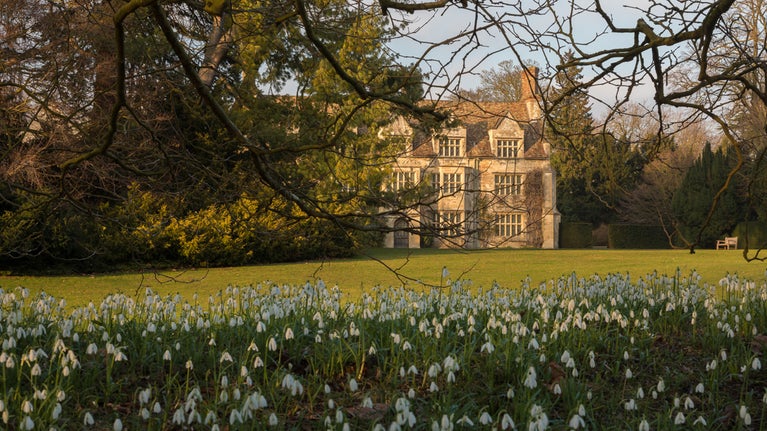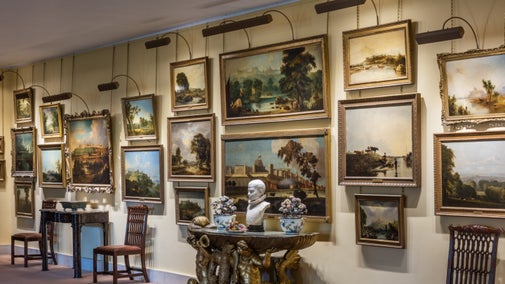
Discover more at Anglesey Abbey and Lode Mill
Find out when Anglesey Abbey and Lode Mill are open, how to get here, the things to see and more.

When it came to designing the garden at Anglesey Abbey, Lord Fairhaven wanted something to show his guests during every season of the year. Today, the garden still follows the same seasonal pattern.
After purchasing the Anglesey Abbey estate unseen at auction in the 1920s, Lord Fairhaven began the process of transforming the garden into a spectacular seasonal display – something that still exists to this day.
Look out for the use of straight, tree-lined avenues with a sculpture at the end to draw your eye, or the use of circles and symmetry in the Formal Garden and Dahlia Garden, open in the summer.
When exploring the estate, look out for the array of statues – widely acknowledged as one of the finest collections of garden statuary in the country.

Anglesey Abbey has 114 acres of landscaped gardens to explore, and a renowned sensory Winter Garden to discover. Stroll through the wider estate on the 3-mile circular walk which takes in woodland, striking tree-lined avenues and winding paths through the historic gardens. Your winter walk is completed with a visit to the Winter Garden, planted for its sensory qualities of scent, texture and bright colour throughout the colder months. Finishing in the iconic grove of ghostly silver birches, it’s not to be missed at this time of year.
The long and narrow Winter Garden was specially designed with plants that are at their best during winter, when colour is in short supply elsewhere. Its position takes full advantage of the low winter sun, which picks out the details of the unusual plants along the way. Plants such as Tilia Cordata 'Winter Orange' and Red-barked Dogwood dazzle with orange and red.
The snowdrop collection here at Anglesey Abbey hosts over 500 individual varieties of snowdrop, with some found right here in our gardens and as such, are named after people and places with links to Anglesey Abbey. Look out for the 'snowdrop hotspot' signs and enjoy seeing snowdrops along the Winter Walk, Woodland Path and Jubilee Avenue from mid-January to February.
Join one of our knowledgeable garden guides to discover our private collection of snowdrops, not usually accessible to visitors. Tour tickets for 2026 are now on sale.

As the name would suggest, our Spring Garden comes into its own in the spring months and features daffodils and hyacinths. The flowers in the garden are complemented by the avenues of Amelanchier lamarckii, more commonly known as June berry, Aesculus x neglecta 'Erythroblastus', a horse chestnut tree with shrimp-pink spring foliage.
In the spring, Lord Fairhaven's choice fluctuated between tulips and hyacinths, blue and white in colour. Planted in uniform rows 'Blue Star' and 'Carnegie' offer a striking blue and white display during the months of March into April. Once these displays are over, they are then removed to make way for a second wave of colour during the late summer and early autumn.
Get ready to see thousands of new daffodils appear that were planted in the autumn of 2024 such as Narcissus 'Dutch Master' and 'Rijnveld's Early Sensation'. You can see these daffodils on the main drive and on Coronation Avenue. The Winter Garden and Monk's Lawn are also good spots to see daffodils.
Join one of our knowledgeable garden guides to find out more about the exciting collection of daffodils here at Anglesey Abbey.
With over 50 varieties to spot across the estate, this tour gives you insight into the subtle differences between the daffodils and a little bit about the history behind them. The 2025 tours have now finished - check back here for new dates next spring.

Situated on what was once the site of dilapidated greenhouses and abandoned vegetable borders, the Rose Garden was one of Lord Fairhaven's first garden projects. In 2024, our much-loved Rose Garden was extended by another 20 beds, 19 cultivars and around 180 new roses thanks to a generous donation from David Austin Roses.
From early June through to October, the Rose Garden produces a vibrant display of 60 varieties of rose. Many of those can be found in our Plant Centre.
Located next to the Dahlia Border, the Herbaceous Border was designed and planted in the 1950s by Major Vernon Daniell, a friend of Lord Fairhaven.
It is based around a broad semi-circle with a central area of grass, and enclosed by beech hedging, creating a room-like feel.
Found to the west of Anglesey Abbey, the Wildflower Meadows cover approximately 25 acres and contain over 50 species of wildflower.
Throughout the summer, the meadows become a hive of activity populated by butterflies, small birds and numerous insects, including very important bees on the search for pollen and nectar.
Opened to the public in 2016, the Skylight Garden is located at the northern end of the East Lawn, and consists of an inner circle of 12 oak structures surrounded by hazel bushes; silver-leafed, pleached lime blocks, ornamental grasses and two triangle-shaped beds planted with lilac.
The garden was designed and created as part of a wider celebration to commemorate the 50th anniversary of Lord Fairhaven's passing.

The hornbeams which form Jubilee Avenue were planted in 1977 to mark the Silver Jubilee of HM Queen Elizabeth. Visit in autumn for a scenic walk bursting with vibrant russet tones.
The creation of Pilgrims' Lawn was the last area of the garden designed by Lord Fairhaven – sadly he did not live to see it in all its glory. Strong yellow and purple colouring predominates, particularly in autumn.
The trees of either side of Quy Water provide a rich burst of colour. On still days you get perfect reflections in the water.
The magnificent Temple is set against a colourful amphitheatre of beech, alder & sycamores.
Drifts of delicate pink cyclamen carpet the understorey as you walk through the trees from the Winter Garden to Lode Mill - a sight not to be missed.

Find out when Anglesey Abbey and Lode Mill are open, how to get here, the things to see and more.
Discover how the Lode Mill was rescued from being derelict for many years and restored by the new owner Lord Fairhaven.

Discover the many layers that Anglesey Abbey and Mill has to offer and explore the long and fascinating history that stretches from 12th-century priory to 20th-century home.

Discover what it takes to volunteer at Anglesey Abbey and the opportunities currently available.

Plan your next family adventure at Anglesey Abbey.
